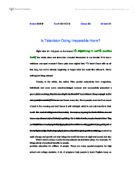Depner, J 1
Jerome Depner
Instructor Dougherty
English 090-56I
20 May 2011
Television: The Plug-In Drug
The essay “Television: The Plug-In Drug” by Marie Winn describes how the first generation of television viewers imagined this new invention would revolutionize the home front. Winn moves on to emphasize how important the television has actually come to families, however not necessarily for the best. Winn continues with excerpts from mothers, teachers, professional therapists, and a host of different types of people describing how a television has become too controlling in modern families. After describing each excerpt Winn summarizes stating that television is destroying families by taking opportunities from families to interact normally. The essay uses many different devices of writing to emphasize the author’s point of view, and lead the readers to believe her analysis is correct.
Winn establishes ethos in the beginning of the essay by discussing the early days of television. She starts the essay by introducing facts on television and quoting well known sources like The New York Times as well as not so well known sources to ensure her readers that she in knowledgeable in the given subject. She continues to build upon her ethos with the types of people she chooses to quote. Winn is writing to an audience of mothers, fathers, and parental figures, she uses quotes and statements from every type of person this audience would look to as peers or someone of high reputes. If you were to read an article written by your child’s teacher telling you something you would probably not question much due to the fact that you have already have a rapport with this person. This technique is used throughout the entire writing, every account is from someone you might know or talk to on a daily basis. By choosing people that the designated audience would feel a connection to Winn automatically has more credibility with the readers than if she were to make the argument on her own







